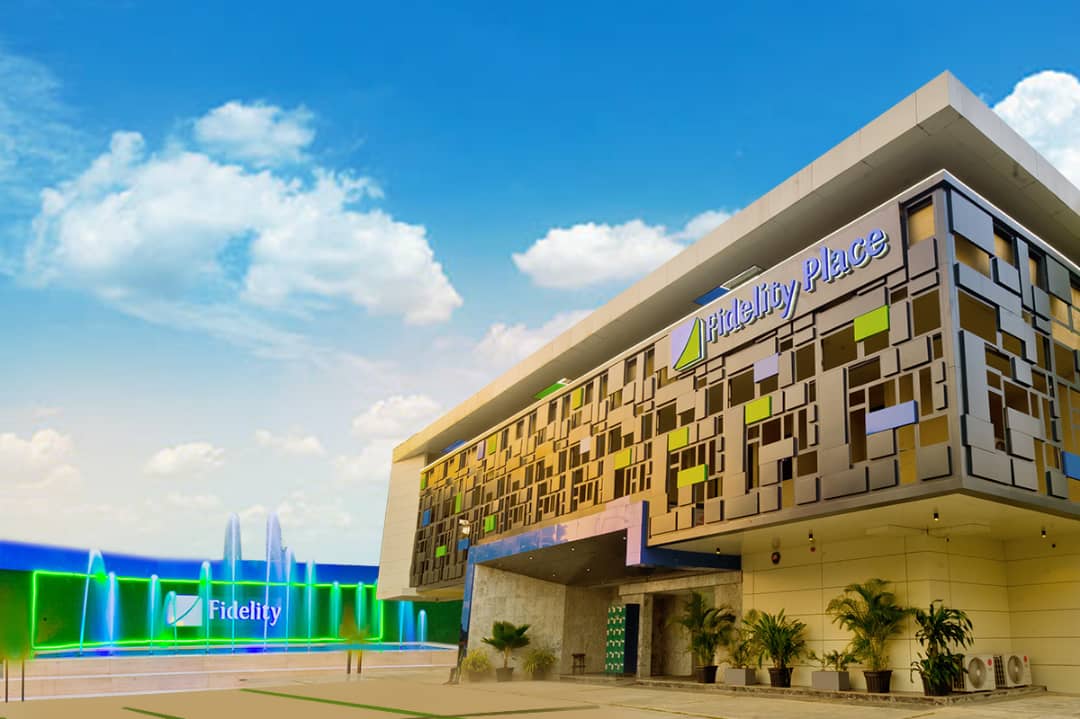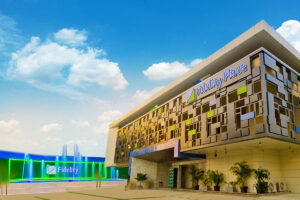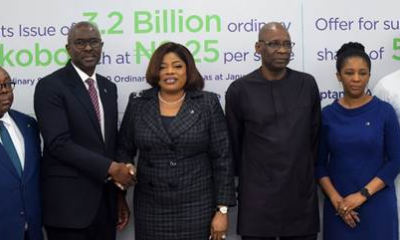Business
Fidelity Bank started recapitalisation before CBN made it compulsory –Amuchie

Fidelity Bank started recapitalisation before CBN made it compulsory –Amuchie
Recently, the Central Bank of Nigeria (CBN) raised the capital base of commercial banks and set the tone for recapitalisation. But one bank that was already working on recapitalisation prior to that is Fidelity Bank Plc.
Revealing this in an interview, Fidelity Bank’s Executive Director, Chief Operations and Information Officer, Mr. Stanley Amuchie, said the bank had in August last year got its shareholders’ nod to recapitalise, only for the CBN to unveil the programme in March 2024.
He said Fidelity Bank was ahead of its competitors in knowing the right thing to do at every point in time.
He spoke on this and other things.
With CBN recapitalisation programme, which affects all banks, where you are on this?
The Central Bank of Nigeria, on March 28, 2024, announced recapitalisation for the banking industry. If you look at Fidelity Bank, we got the approval of our shareholders on August 11, 2023. That shows that, as a bank, we understand our business as well as the environment. We have done what we call Capital Needs Assessment. Based on that, therefore, we went out to seek approval of our shareholders to raise capital. And what we are trying to do is to issue 10 billion units of shares in public offering at N9.75k per share; and 3.2 billion units of shares by way of right issue to existing shareholders at N9.25k per share. That process has been in play. The signing ceremony is a step towards opening to the market. And that was why, a few days ago, on June 5, we had the signing ceremony. Of course, the processes involves getting all the parties together.
Who are these parties?
The parties will be the people at the issuing houses, the receiving banks, the reporting accountants and then the stockbrokers. Those are the people that will make up the parties to the offer. We have gone through the processes of getting all the people together, as well as prepared documents for the Securities and Exchange Commission (SEC) for approval. We have also secured approval of the Nigeria Stock Exchange Commission (NSEC) and that of the Nigeria Exchange Limited (NGX) and then held the signing ceremony. The next step is to secure the final approval of SEC to open the offer to the market. And we hope to open the offer on June 20 this year. It will be open for 28 working days. What it means is that, we will close on July 29, 2024.
It looks like you want to go into the market before others and ensure you get your shares before the competition gets stiff…
Like I said, we started this process earlier, because ours is based on strategy. This is because we are looking at our current business. We believe we had enough capital to do our business but we are looking at growth, which is why we are projecting growth. We believe that, if you want to grow, you must have what it takes. I want to liken capital to what oxygen is to human beings. If you don’t have enough oxygen, you will suffocate. Therefore, we looked at the growth process and what we needed to do, hence we started ours quite early. We didn’t wait. Remember, we were not reacting to CBN’s pronouncement. We have been very proactive about our capital base. That is what we are doing.
Ir seems there are some jitters, maybe not so much, but when the news about the revocation of Heritage Bank’s license came out, banking stocks dropped, people were asking questions, and now you are going to the market. How do you convince the people that Fidelity Bank is safe?
Let me say this again. Fidelity Bank Plc is very safe. This is a bank that has shown capacity and growth over the years. For instance, in the last five years, if you look at the stock, which is what we are talking about, you will appreciate the value our bank has created between May 2019 and May 2024. The value or the share price of Fidelity has grown by 507 percent or at N1.68k as at 31st of May, 2019, to N10.20k as at 31st of May, 2024. That is 507 per cent growth. What this means is that we have grown at an average of over 100 percent for every year.
You hit a new record high, over one hundred and four thousand, for the all-share index?
Yes. For all that has happened, you will see that our bank grew more than two times the all-share index. Even if you talk about the banking index, which is what tracks the value of shares of the banking industry, our bank did four times.
What are the chances of mergers, or are you looking at acquiring some banks?
Everything is on the table. For now, what we are trying to do is to get additional capital at the level where we are today. And by the time we get that, we will be in a very good position to look at what is ahead of us.
What of acquiring banks that need help, which will also increase your branches and assets?
Those are very possible. Like I said, everything is on the table for us. Our plan is to put ourselves in that position where you can think clearly and then be able to take any decision. And if we need to acquire, there has to be value. We will look at those who bring that synergy we will need. That is what we are looking at. But aside from that, we are well positioned. For the offer that is about to open, we are already getting feelers that people are seeing the investments in Fidelity and what it has done over the years. That is why they are very eager to be part of what is happening in Fidelity.
What is the major drive for capital that you are looking to get from the market?
When you are in business, at every point in your business, you need to sit back and look at where you are going to. We have seen a lot of growth in Fidelity in the last three to five years, in almost all the indices. If you look at indices like gross earnings, we’ve seen growth from N206 billion in 2020 to N556 billion in 2023 on gross earnings. That is a cumulative average growth rate of about 39 per cent. Similarly, our Profit Before Tax (PBT) grew from N28 billion to N124 billion by the end of 2023. That is a cumulative growth rate of 64 per cent. Moreso, savings accounts and deposits have also grown, significantly.
So, almost all the performance Indices have been on trajectory of growth. Therefore, you appreciate the kind of businesses you are seeing on the horizon at this moment. In this regard, what we have done, essentially, is to look at the Capital Needs Assessment, because we are getting more businesses, which is why we need to increase our capital, to be able to take on more businesses so that we do not get businesses we cannot handle. And like I said, capital in business is like what oxygen is to human beings.
Small business owners do say that commercial banks are not their friend at all. Do you think this new capital will get to small businesses?
Fidelity Bank has always been known for supporting small and medium enterprises (SMEs). Our bank has won several awards for SMEs support and there are probably only a few banks, if any, that have supported SMEs the way Fidelity has done. Our bank is more like an SMEs’ bank. We’ve grown new champions in the market and that is what we are known for. I can assure you that we will continue to do that, even better in the years ahead.
Recently, the Independent Project Monitoring Company recognised Fidelity Bank. What is the bank doing diffetently in Environmental, Social and Governance to warrant such recognition?
We are doing a lot. Today, we are one of the banks in Nigeria that have taken ESG to a greater level. We are doing a lot on the environment, staff (socials), and corporate governance. Therefore, if you talk about governance board, of course, ours is recognized as one of the strongest boards in the banking industry in Nigeria. We have people from different facets of the economy: oil and gas, investment banking and others. It goes to show that the quality of the board and its discussions are very strong. Then talk about the environment; we are doing paperless office, green financing and all. These are the things they have seen and that is why they recognised us.
Business
Access Holdings embarks on N351 billion rights issue to strengthen capital base

Access Holdings embarks on N351 billion rights issue to strengthen capital base
Access Holdings Plc has held a formal signing ceremony as part of the arrangements to raise a total of N351 billion by way of a rights issue to existing shareholders.
The offer is part of the group’s strategy to enhance its working capital requirements, which includes organic growth funding for its banking and non-banking subsidiaries.
Subject to approval by the SEC
According to the group in a statement, subject to the approval of the Securities and Exchange Commission (SEC), the acceptance and application lists for the rights issue are expected to open on Monday, July 8, 2024, and close on Thursday, August 8, 2024.
Access Holdings’ shareholders had at its 2nd Annual General Meeting (AGM), which was held on Friday, April 19, 2024, backed its plan to execute a Capital Raising Programme of about $1.5 billion as well as the subset initiative to raise capital through a rights issue of ordinary shares to its shareholders.
The Group stated that, under the Rights Issue, 17.772 billion ordinary shares with a nominal value of N0.50 each will be offered at N19.75 per share, on the basis of one new ordinary share for every two existing ordinary shares held as of Friday, June 7, 2024.
2023-2027 strategic plan
At the Signing Ceremony, Acting Managing Director/Chief Executive Officer of Access Holdings Plc, Bolaji Agbede, disclosed that “The Rights Issue is a significant step in delivering our 2023-2027 strategic plan. The additional capital will enable us to maximise emerging opportunities and deliver long-term value to our shareholders.”
Agbede disclosed that Chapel Hill Denham is the Lead Issuing House to the Offer, while Atlas Registrars Limited will serve as Registrars through the exercise.
“The Joint Issuing Houses are Coronation Merchant Bank, Stanbic IBTC Capital, Vetiva Advisory Services, Greenwich Merchant Bank, FCSL, First Ally Capital, FCMB Capital, Renaissance Capital Africa and Meristem Capital,” he said.
Other parties to the Offer according to him are Coronation Merchant Bank, Coronation Securities, Chapel Hill Denham Securities Limited, FSDH Capital, Cordros Capital, Cowry Securities, First Integrated Capital Management Ltd, Network Capital Ltd, CSL Stockbrokers Limited, Compass Investment & Securities Ltd, PAC Securities Limited, Dynamic Portfolio, Chartwell Securities Limited, Tiddo Securities Limited, and Futureview Securities Limited.
He noted that the Rights Circular for the Issue, which contains a Provisional Allotment Letter and the Participation Form, will be mailed directly to shareholders of the Group. Printed copies of the Participation Form can also be obtained at any Access Bank branch and the offices of the Issuing Houses during the Offer Application Period.
“All existing shareholders and prospective investors are encouraged to read the Rights Circular and Prospectus and, where in doubt, consult their Stockbroker, Fund/Portfolio Manager, Accountant, Banker, Solicitor, or any other professional adviser for guidance before subscribing,” he said.
Business
Reasons Investors Might Purchase Fidelity Bank’s Offerings, as Identified by Capital Market Stakeholders

Reasons Investors Might Purchase Fidelity Bank’s Offerings, as Identified by Capital Market Stakeholders
Fidelity Bank Plc started its N127.1 billion combined rights and public offers to a rousing support from the investing public as key capital market stakeholders recalled the symbolic importance of Fidelity Banks impressive growths and investor-friendly disposition over the years.
From the Nigerian Exchange (NGX) to stockbrokers, investors and customers; the N127.1 billion combined rights and public offer received unreserved recommendations, with industry thought leaders citing the performance of Fidelity Bank in its core banking operations and as a quoted company at the stock market.
They said Fidelity Banks N127.1 billion combined rights and public offer was the right way for the nations banking recapitalisation exercise to start as the bank, which has the highest corporate governance rating and an average annual capital gain of more than 100 per cent at the stock market, has strong appeal to the investing public.
Fidelity Bank is offering a rights issue of 3.2 billion ordinary shares of 50 kobo each at N9.25 per share.
The bank is also simultaneously offering 10 billion ordinary shares of 50 kobo each to the general investing public at N9.75 per share.
The acceptance and application lists for the rights issue and public offer, which opened on Thursday, June 20, 2024, are scheduled to close on Monday, July 29, 2024.
The rights issue has been pre-allotted on the basis of one new ordinary share for every 10 existing ordinary shares held as at the close of business on Friday, January 05, 2024.
The Doyen of Stockbrokers, the oldest practicing stockbroker, Alhaji Rasheed Yussuff, said Fidelity Bank has good records going for it with its history of impressive growth and profitability and dividend payments.
According to him, the bank is known to the market as a good investment, with evident records of impressive returns and corporate responsibility.
Yussuff, who was already a leading stockbroker and managing director of Trust Yields Securities Limited in 2004-2005 when Fidelity Bank launched its initial public offering (IPO) and listed its shares at the stock market, said the bank has been hitting all positive records that should encourage investors to buy more into it.
Referencing the banks impressive returns, Yussuff, who has more than five decades in the capital market and was principal dealing clerk for ICON Limited/ICON Stockbrokers in 1976, particularly noted that Fidelity Bank has been paying good dividends.
Chairman, Association of Securities Dealing Houses of Nigeria (ASHON), Mr Sam Onukwue, who recalled the founding days of Fidelity Bank in 1987, said he had watched Fidelity Bank sustained commendable growth trajectory over the years.
He said the bank has shown exceptional growth and resilience, rising from being a private merchant in 1987 to becoming one of the largest, publicly quoted commercial banks in Nigeria. Fidelity Bank is one of the seven Nigerian banks with international banking licences.
Onukwue, who is also managing director of Mega Equities Limited, said Fidelity Banks history of performance underlines the strength of its management, noting that the bank has proven to be able to keep investors trust.
Chairman, Nigerian Exchange (NGX), Mr. Ahonsi Unuigbe said the combined offer marked a pivotal moment for the bank and the financial services sector.
This is a testament to Fidelity Banks unwavering commitment to strengthening its own capital base and ensuring sustainable growth through amazing roles played by all of the professional parties to this transaction,
Unuigbe, an investment banker and former director at Standard Bank, said.
He said the new banking recapitalisation is aimed at bolstering the resilience and stability of the nations financial institutions.
According to him, the ongoing recapitalisation has set robust minimum capital requirements that will ensure Nigerian banks are not only more solvent, but also capable of supporting the growth and development of the economy.
Acting Chief Executive Officer, Nigerian Exchange (NGX), Mr. Jude Chiemeka, commended Fidelity Bank for its performance and willingness to avail the investing public of every relevant information.
He assured that the NGX remains committed to supporting companies like Fidelity Bank in its quests to deepen the capital markets and fostering an environment conducive to sustainable growth and innovation.
Founder, KAM Holding, Dr Kamoru Yusuf, said Fidelity Bank has shown to be an exceptional bank with focus on the development of Nigerian economy and companies.
He said investing in Fidelity Bank will be an investment in the growth of Nigerian economy and companies like KAM Holding, the nations largest wholly indigenous metal and steel production company.
Yusuf, whose group has metamorphosed into a global business conglomerate operating in three countries across two continents, confirmed that KAM Holding has benefited immensely from financial supports from Fidelity Bank.
Yusuf, who was physically present at a session at the NGX to present facts behind the offer to the investing public, underlined the relationship between increased capital for a business-focussed bank like Fidelity Bank and the overall development of the Nigerian economy.
Addressing the investing public at the NGX, Managing Director, Fidelity Bank Plc, Dr Nneka Onyeali-Ikpe, reiterated the commitment of the bank to delivering impressive returns to shareholders and supporting the growth of the Nigerian economy.
She explained that the new capital raising by Fidelity Bank was driven by its proactive business expansion plan having secured shareholders approval to raise new equity funds as early as August 2023.
The Central Bank of Nigeria (CBN)s directive on new minimum capital was released in March 2024.
The offer will increase our capacity to support our customers and their businesses.
In summary, this capital raise will help our customers to grow, their businesses to thrive, and their economy to prosper, Onyeali-Ikpe said.
She assured that with its groundswell of supports from enthusiastic shareholders, customers and stakeholders, the bank is on course to achieving the N500 billion new minimum capital base, which will clearly confirm the bank, beyond any doubt, as one of the biggest banks in Nigeria.
Onyeali-Ikpe noted that being the first bank to launch offer out of the many banks in Nigeria after the CBN directive,
Fidelity Bank has shown again to be a pace-setter.
According to her, Fidelity Bank seeks the CBN recapitalization directive as a significant opportunity for a stronger and more resilient banking industry.
We have embraced the challenge as a catalyst to propel us, towards a long-term vision of becoming a market leader across every product that we offer and segment that we sell, not just in Nigeria, but as an international bank, Onyeali-Ikpe said.
She said the proceeds from the N127.10 billion capital raising exercise would be instrumental in achieving its strategic growth plan.
She highlighted that the funds, firstly, would be deployed to drive, business growth and regional expansion.
We will strategically expand our footprints within and outside Nigeria to serve as a broader customer base and to unlock new market opportunities.
Secondly, we will have what we call technological transformation. We are committed to leveraging proprietary technology to improve operational efficiency and deliver exceptional customer service.
Thirdly, we intend to diversify and grow. By investing in information technology (IT) infrastructure and product distribution channels, we will aim to diversify our earnings base through digitalization and business expansion, Onyeali-Ikpe said.
She said the management recognised the importance of investors and are committed to delivering value to them as well.
Our track record of accelerated growth and consistent dividend payment is a testament to this, Onyeali-Ikpe said.
A recent review had shown that Fidelity Bank outperformed all major market indices for measuring returns at the Nigerian stock market, with the banks average annual return over the past five years twice the average return by the overall market and almost four times of average return in the banking sector.
A review of official trading reports at the Nigerian stock market showed that investors in Fidelity Bank have earned more than 507 per cent in capital gains over the past five years, between May 31, 2019 and May 31, 2024
Fidelity Banks share price rose by 507.14 per cent over the period, representing average annual capital gain of 101.43 per cent.
This significantly exceeds all other major return benchmarks, including the banking sector.
With 507 per cent capital gain in five years and average annual gain of more than 100 per cent, the return analysis implies that investment in Fidelity Bank is more attractive than other class of assets, including fixed-income securities such as government and corporate bonds; real estate investment and mutual funds among others.
These returns underscore Fidelity Banks immense value as a stock for all times, helping investors to hedge against inflation while preserving significant long-term value.
The high divisible nature of shares investment and high free float of Fidelity Bank, which makes the banks shares easily available, underline the bank as a most attractive investment option for all cadres of investors- small, medium and high networth; retail and institutional investors.
The All Share Index (ASI) – the common, value-based index that tracks all share prices at the Nigerian Exchange (NGX), which is widely regarded as Nigerias benchmark for equities market, recorded a five-year return of 219.61 per cent, an average annual return of 43.9 per cent.
Contrary to the significantly above average performance of Fidelity Bank, the NGX Banking Index-which tracks the banking sector, doubled by 120.53 per cent over the five-year period, representing average annual return of 24.11 per cent, more than 77 percentage points below Fidelity Banks average return.
Two other major price indices- the NGX 30 Index and NGX Main Board Index, recorded five-year cumulative return of 185.73 per cent and 265.6 per cent respectively, representing average annual gain of 37.15 per cent and 53.1 per cent respectively.
The NGX 30 Index tracks share prices of the 30 largest companies at the stock market while the NGX Main Board Index represents the largest and most diversified group of listed companies at the stock exchange.
Fidelity Bank is quoted on the main board, like most other major banks and companies at the stock market.
The average annual return of 101.43 per cent underlines that Fidelity Bank provides substantial return for investors, even where such investors had borrowed money at the ruling interest rate and the invested fund was adjusted for impact of inflation rate.
Nigerias inflation rate peaked at a high of 33.69 per cent in April 2024 while the Central Bank of Nigeria (CBN)s Monetary Policy Committee (MPC) recently increased the Monetary Policy Rate (MPR), otherwise known as benchmark interest rate, to 26.25 per cent.
Fidelity Banks share price, which closed May 31, 2019 at N1.68 per share, rose successively to N10.20 per share by the end of May 2024.
The ASI had, during the period, rose from its opening index of 31,069.37 points to close weekend at 99,300.38 points. The NGX Banking Index rose from 361.57 points to 797.37 points.
The NGX 30 Index, which opened the period at 1,286.68 points, closed the period at 3,676.44 points.
The NGX Main Board Index appreciated from 1,267.54 points to close weekend at 4,634.31 points.
Business
GTCO Recognized as Nigeria’s Leading Banking Brand

GTCO Recognized as Nigeria’s Leading Banking Brand
Africa’s leading financial services institution, Guaranty Trust Holding Company Plc (“GTCO” or “the Group”), has added to its impressive haul of accolades as it was recently named Nigeria’s strongest brand and Best Banking Brand in Nigeria by Brand Finance and Global Brands Magazine, respectively.
These awards not only reaffirm GTCO’s position as a leading financial services group but also spotlight the Group’s enduring reputation as a customer-focused brand.
Over the years, GTCO has demonstrated remarkable commitment to shaping the future of financial services in Africa and is renowned for its innovative approach to customer service and stakeholder engagement.
The Group’s brand strength is underpinned by a strong commitment to delivering cutting-edge financial solutions, fostering meaningful customer relationships, and Promoting Enterprise using its proprietary free business platforms.
Commenting on the two awards, the Group Chief Executive Officer of Guaranty Trust Holding Company Plc, Segun Agbaje, said:
“These achievements are a reflection of our unwavering commitment to excellence, innovation, and customer satisfaction, as well as to building a truly international brand from our proudly African roots. We are delighted to receive these recognitions and inspired to continue delivering our promise of enriching lives with every opportunity.”
GTCO is a leading financial services group with banking operations in Nigeria, West Africa, East Africa, and the United Kingdom alongside non-banking verticals in HabariPay, Guaranty Trust Fund Managers, and Guaranty Trust Pension Managers.
Its leadership in the banking industry and efforts at empowering people and communities has earned it many prestigious awards over the years.
The Group’s flagship banking franchise, Guaranty Trust Bank, was named Nigeria’s Best Bank and Best Bank in CSR at the 2023 Euromoney Awards for Excellence, Best Banking Group in Nigeria by World Finance, and Best Bank in Nigeria by Global Finance.
Guaranty Trust Bank is featured in the Top 1000 Banks in the World and Top 100 Banks in Africa rankings by The Banker.
-

 News2 years ago
News2 years agoWhat Led Us To Choose Peter Obi As Our Candidate?-Middlebelt Forum
-

 BREAKING NEWS10 months ago
BREAKING NEWS10 months agoKey Insights for the Upcoming 2023/2024 UEFA Champions League Campaign
-

 Entertainment8 months ago
Entertainment8 months agoTaylor Swift Skips Travis Kelce’s Big Game to Prepare for ‘Eras Tour’
-

 News6 months ago
News6 months agoPaul Agbonze Obazele Addresses Labor Party Leaders in Edo Central Senatorial District
-

 BREAKING NEWS10 months ago
BREAKING NEWS10 months agoVan Gaal Alleges 2022 World Cup Rigged in Favor of Messi and Argentina
-

 BREAKING NEWS11 months ago
BREAKING NEWS11 months agoBayern Munich Engages in Discussions for the Acquisition of David De Gea from Manchester United
-

 News1 year ago
News1 year ago“New King of Serie A,” Tinubu hails Osimhen on winning the Serie A Title
-

 News2 years ago
News2 years agoHappy 62nd Anniversary of Nigeria’s Independence!















